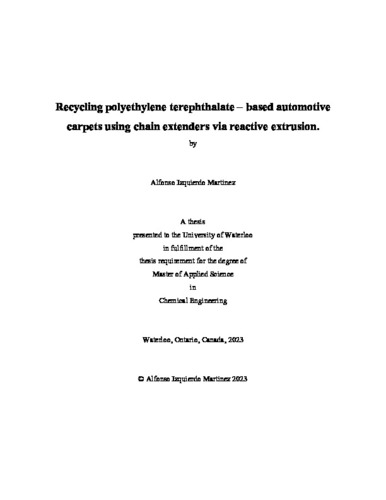| dc.contributor.author | Izquierdo Martinez, Alfonso | |
| dc.date.accessioned | 2023-05-09 13:21:10 (GMT) | |
| dc.date.available | 2023-05-09 13:21:10 (GMT) | |
| dc.date.issued | 2023-05-09 | |
| dc.date.submitted | 2023-04-28 | |
| dc.identifier.uri | http://hdl.handle.net/10012/19430 | |
| dc.description.abstract | Polyethylene Terephthalate (PET) is a common polyester used in various applications, ranging from packaging to clothing. The automotive industry utilizes this material to manufacture the velour carpet mats used in cars, rising environmental legislation surrounding this industry has led to the need of developing a recycling process for these velour carpet trims (Murray, 2017). In order to recycle this material, the challenge of polymer degradation must be addressed. To overcome this issue chain extenders will be used to conduct a reactive extrusion recycling method for this material. Pyromellitic dianhydride (PMDA) and 1,3 – Bis(4,5-dihydro-2-oxazolyl) benzene (PBO) will be synergistically used under reactive extrusion conditions, a twin-screw extrusion process was carried out at 60RPM and evaluated at a temperature range of 265-285°C and various chain extender concentrations. The target of this research paper is meeting the 0.7 dL/g I.V. recycling industry target for PET-based materials. Two design of experiments were utilized in this investigation; the first DOE was tested at a constant 265°C, a PMDA concentration of 5wt% and 3.50wt%, and a PBO concentration of 2.00 wt% and 0.75 wt%. The results from this DOE were used to generate a model that estimated a new optimized zone to evaluate, the second DOE evaluated the extrusion temperature, and chain extender formulation. In this second DOE the extrusion temperature was varied at 265 and 285°C and an optimized formulation was evaluated at a PMDA concentration of 3.50 wt% and 1.75wt%, with a PBO concentration of 2.75wt% and 1.00 wt%. Main parameter evaluated was the intrinsic viscosity and the conditions that yielded the highest I.V. value, 1.036 dL/g, was extruded at 285°C with a PMDA concentration of 3.0wt% and PBO at 1.00 wt%. The Mark-Houwink equation was then used to estimate the molecular weight of this material yielding an Mw of 83, 082. While the results obtained in this work met the goal of 0.70 dL/g, the formulation could still be further optimized to 3.0wt% PMDA, 0.05wt% PBO and 285°C to increase the I.V. to 1.20 dL/g. | en |
| dc.language.iso | en | en |
| dc.publisher | University of Waterloo | en |
| dc.subject | chain extenders | en |
| dc.subject | reactive extrusion | en |
| dc.subject | recycling | en |
| dc.subject | pyromellitic dianhydride (PMDA) | en |
| dc.subject | 1,3 –Bis(4,5-dihydro-2-oxazolyl)benzene (PBO) | en |
| dc.subject | polyethylene terephthalate (PET) | en |
| dc.title | Recycling polyethylene terephthalate – based automotive carpets using chain extenders via reactive extrusion | en |
| dc.type | Master Thesis | en |
| dc.pending | false | |
| uws-etd.degree.department | Chemical Engineering | en |
| uws-etd.degree.discipline | Chemical Engineering | en |
| uws-etd.degree.grantor | University of Waterloo | en |
| uws-etd.degree | Master of Applied Science | en |
| uws-etd.embargo.terms | 0 | en |
| uws.contributor.advisor | Simon, Leonardo | |
| uws.contributor.affiliation1 | Faculty of Engineering | en |
| uws.published.city | Waterloo | en |
| uws.published.country | Canada | en |
| uws.published.province | Ontario | en |
| uws.typeOfResource | Text | en |
| uws.peerReviewStatus | Unreviewed | en |
| uws.scholarLevel | Graduate | en |

